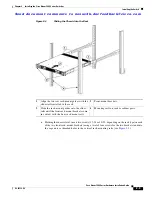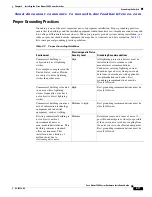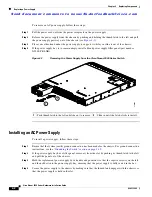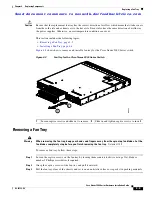
S e n d d o c u m e n t c o m m e n t s t o n e x u s 3 k - d o c f e e d b a c k @ c i s c o . c o m
3-3
Cisco Nexus 3000 Series Hardware Installation Guide
OL-25338-04
Chapter 3 Connecting to the Network
Connecting to the Management Port
•
Configure SNMP agent parameters.
•
Download software updates.
Note
To connect the console port to a computer terminal, the computer must support VT100 terminal
emulation. The terminal emulation software (such as HyperTerminal or Procomm Plus) makes
communication between the Cisco Nexus 3000 Series switch and a computer possible during setup and
configuration.
To connect the console port to a computer terminal, follow these steps:
Step 1
Configure the terminal emulator program to match the following default port characteristics: 9600 baud,
8 data bits, 1 stop bit, no parity.
Step 2
Connect the RJ-45 connector of the console cable to the console port (see
Figure 3-1 on page 3-2
) and
the DB-9 connector to the computer serial port.
Note
For configuration instructions, see the appropriate Cisco Nexus 3000 Series CLI configuration
guide.
Connecting to the Management Port
Caution
To prevent an IP address conflict, do not connect the management port to the network until the initial
configuration is complete (see the
“Connecting to the Console Port” section on page 3-2
). For
configuration instructions, see the Cisco Nexus 3000 Series CLI configuration guides.
This section describes how to connect the management ports to an external hub, switch, or router. The
Ethernet connector port has an RJ-45 interface. To connect the management port to an external hub,
switch, or router, follow these steps:
Step 1
Connect the appropriate modular cable to the Ethernet connector port:
•
Use modular, RJ-45, straight-through UTP cables to connect the management port to an Ethernet
switch port or hub.
•
Use a crossover cable to connect to a router interface.
Step 2
Connect the other end of the cable to the device.
Connecting to a Server
For the Cisco Nexus 3016 switch, you must use QSFP+ transceivers connected to optical or copper
cables to connect the 40-Gigabit ports to the hosts or servers in the network. If the servers or switches
you are connecting to are in the same rack or an adjacent rack, it is typically cost effective to use the


































